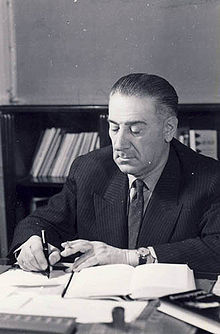Mihai Ralea
| Mihai Dumitru Ralea | |
|---|---|

Ralea at his desk, photographed c. 1960
|
|
| Born |
May 1, 1896 Huși, Kingdom of Romania |
| Died | August 17, 1964 (aged 68) outside East Berlin, German Democratic Republic |
| Residence | Eastern Europe |
| Other names | Mihail Ralea, Michel Raléa, Mihai Rale |
| Academic background | |
| School or tradition | |
| Influences | Henri Bergson, Célestin Bouglé, Émile Durkheim, Friedrich Engels, Paul Fauconnet, Ludwig Gumplowicz, Dimitrie Gusti, Lucien Herr, Garabet Ibrăileanu, Pierre Janet, Jean Jaurès, Ludwig Klages, Vladimir Lenin, Lucien Lévy-Bruhl, André Malraux, Karl Marx, Max Scheler, Werner Sombart, Joseph Stalin |
| Academic work | |
| Era | 20th century |
| Main interests | political sociology, sociology of culture, aesthetics, anthropology, social psychology, national psychology, social pedagogy, Marxist sociology, Romanian literature |
| Influenced | Matei Călinescu, Adrian Marino, Tatiana Slama-Cazacu, D. I. Suchianu |
Mihai Dumitru Ralea (also known as Mihail Ralea, Michel Raléa, or Mihai Rale; May 1, 1896 – August 17, 1964) was a Romanian social scientist, cultural journalist, and political figure. He debuted as an affiliate of Poporanism, the left-wing agrarian movement, which he infused with influences from corporatism and Marxism. A distinguished product of French academia, Ralea rejected traditionalism and welcomed cultural modernization, outlining the program for a secular and democratic "peasant state". His ideology blended into his scholarly work, with noted contributions to political sociology, the sociology of culture, and social and national psychology. He was a professor at the University of Iași and, from 1938, the University of Bucharest.
By 1935, Ralea had become a doctrinaire of the National Peasants' Party, managing Viața Românească review and Dreptatea daily. He had publicized polemics with the far-right circles and fascist Iron Guard, which he denounced as alien to the Romanian ethos. He later drifted apart from the party's centrist leadership and his own democratic ideology, setting up a Socialist Peasants' Party, then embracing authoritarian politics. He was a founding member and Labor Minister of the dictatorial National Renaissance Front, representing its corporatist left-wing. He fell from power in 1940, finding himself harassed by successive fascist regimes, and became a "fellow traveler" of the underground Communist Party.
...
Wikipedia
